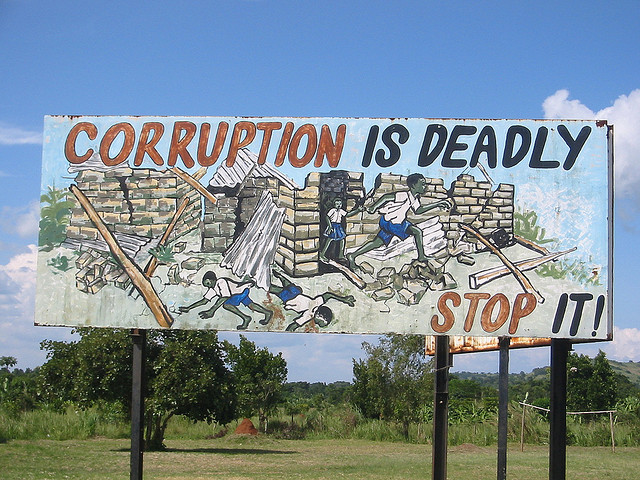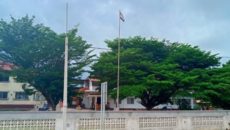Since the onset of the Ebola virus outbreak in March 2014, the international community, humanitarian organizations, private corporations and citizens have sent the Liberian government relief funds to aid in controlling the spread of the virus. Between August 1, 2014 and October 31, 2014 the Liberian government received US$15.1 million for Ebola relief which were channeled through the National Ebola Task Force which was replaced by the Incident Management System. The government of Liberia authorized the General Auditing Commission to conduct audits of the National Ebola Trust Fund to provide accountability and transparency into public resources.
The report identified US$792,000 in financial irregularities, lack of or inadequate documentation, unreported fuel, unverified fixed assets and in some cases negative confirmation from third parties. The General Auditing Commission auditors were also unable to conclude portions of the audit due to a lack of evidence.
Violations
The following financial violations were found to have been recurring during the period of August 2014 to October 2014 under the management of the National Ebola Trust Fund management team:
- There were payments without supporting documentation.
- Government agencies were conducting business transactions with their employees (ex. an employee of the department being would be paid as a separate business entity to provide catering services.)
- There were special allowances distributed with no procedures in place or documentation
- Fixed assets could not be physically verified.
- There was a lack of fuel distribution logs.
Explanations for Circumventing Public Procurement and Concessions Commission Procedures
- Many businesses closed during the epidemic and those opened would operate only on a cash basis, although this is prohibited by the Public Procurement and Concessions law.
- The urgent nature of the epidemic caused many implementing partners to circumvent standard administrative procedures in order to provide rapid response.
- Fixed assets that were reportedly missing were in fact reassigned to different areas.
- Many banks in the counties were closed so allowances made in cash by county health officials. Because few employees were willing to work on assignments related to virus containment strategies, the remaining staff were paid in cash to incentivize continued work.
- Fuel logs were incomplete due to the urgent nature of the outbreak.
- Sole-sourcing was only done because many businesses were closed. Most implementing partners were aware that this was a violation of Public Procurement and Concessions Commission procedures.
Background
The National Ebola Trust Fund was created by President Ellen Johnson Sirleaf in July 2014 in reaction to the Ebola epidemic. All funds received from government agencies, business partners of the government, and citizens were to be deposited into an account at the Central Bank of Liberia.
The National Ebola Trust Fund was managed by the Incident Management System, which dispersed a total of $10.7 million of the $15.1 million received. The following individuals were responsible for managing the National Ebola Trust Fund:
- Tolbert Nyenswah – Manager
- Dorbor Jallah – Deputy Manager
- Saah N’Tow – Deputy Manager
- Andre Pope – Special Comptroller
- Wede Elliott-Brownell – Special Comptroller
The implementing partners, or government agencies that were tasked with aiding and managing the Ebola outbreak, and the monies disbursed to each are below:
- Bureau of Immigration & Naturalization – US$357,445
- Liberia National Police – US$818,921
- Ministry of National Defense – US$442,436
- National Bureau of Concessions/Dead Body Management Team – Not Available
- Ministry of Information, Culture, Tourism – US$17,500
- Ministry of States for Presidential Affairs – US$130,000
- Ministry of Internal Affairs – US$577,639
- Ministry of Health & Social Welfare – US$2,460,089
- Incident Management System – National Ebola Task Force – US$5,726,137
GAC Audit
The purpose of the audit, according to the General Auditing Commission and the National Ebola Task Force, was to accurately trace and account for all disbursement and purchases relating to the Ebola outbreak and to identify government employees and officials that have willfully or negligently failed to collect or receive monies belonging to the government. The audit also intended to review controls in place for ensuring accountability.
The audit identifies non-effective or efficient operations, non-compliance with authorities and accountability resources, waste and instances of abuse, although these were outside the scope of the initial audit request.
The auditing report submitted by the General Auditing Commission reveals the financial activities relating to the National Ebola Trust Fund was marred by financial irregularities and unverifiable assets. Examples of unaccounted for funds include:
- US$30,000 that was transferred to a UK-based communications company for support with Ebola relief efforts lacked any paper trail to verify that the funds were sent or received by the company.
- US$672,000 was disbursed by the Ministry of Defense with no supporting documentation
- Payments in the amount of L$853,875 (US$10,165) were made to Bureau of Immigration officers in counties in which they did not work.
- Seven generators, each costing US$1085, we reportedly purchased but were unable to be physically verified in any of the seven counties to which they were assigned.
- A total of L$308,650 (US$3,674) was reportedly spent on activities related to the Ebola epidemic in Nimba and Grand Kru. However inadequate supporting documentation was provided to verify expenses.
- US$89,000 worth of fixed assets was purchased by the Incident Management System without any written contracts. No documentation or explanation was provided for the procurement of vehicles, rice, generators and supplies.
- Authorization was not obtained from the Public Procurement and Concessions Commission to purchase three vehicles totaling US$62,000
Detailed Examples of Discrepancies
The Incident Management System made payments indicated for Ebola awareness to two NGOs, the Inter-Religious Council of Liberia and Samaritan’s Purse in the amounts of US$85,000 and US$89,617 respectively. These were never reconciled with financial reports as required by Public Financial Management regulations.
The following vendors received payments for which no contracts were in place, which is a violation of the Public Procurement and Concessions Act.
- H&A Corporation – US$38,220, for 165 KV generators
- James N. Davies & Son – US$19,584, for 1,200 bags of rice
- Africa Motors – US$31,360, for 15 passenger busses
Payments to Implementing Partner agencies were made from the Government of Liberia’s financial account instead of the National Ebola Trust Fund account set up specifically for such purpose. Remitting funds from the government of Liberia’s account makes it difficult to accurately report actual amounts sent to the following agencies:
- Ministry of Internal Affairs
- Ministry of National Defense
- Bureau of Immigration & Naturalization
- Liberia National Police
Wage payments to 52 officers in three counties appeared to have been over reported based on the confirmed amount received by the officers. The difference in payments sent and received is L$94,500 (US$1,125).
The auditor general also found that 68 officers were paid for services in 10 counties where they were never assigned. Their names could not be traced to the daily attendance records, nor were they physically seen in the locations to which they were assigned. The response from the National Ebola Trust Fund management team was that the personnel in question were on “covert temporary assignment†and that they were each stationed to several different counties.
The auditors requested attendance records to confirm these officers were indeed performing services on the days and locations for which they were paid.
In another instance, the National Ebola Trust Fund provided US$672,000 USD to the Ministry of National Defense. There were no supporting documentation for how these funds were distributed nor did the General Auditing Commission receive any reply after requesting supporting documentation from the ministry.
Photo: Futureatlas.com




The foundation of corruption is a total disregard of the future of others. It’s fueled by gratification of the NOW while sacrificing the THEN. Its goal is the self without any relevance to humanity as a whole. While the goal of corruption is selfish, its consequence is unselfish. By the way, it is not one’s position that causes him to be corrupted. Rather, it reveals who he was before assuming the position. If corruption is to be minimized in any meaningful way, the corrupted has to become a new man. He needs a renaissance of his corrupted human spirit to that of his creator’s through the redemption plan fulfilled by Jesus.
(THANKS MISS BANGURA FOR YOUR PIECE ON CORRUPTION)